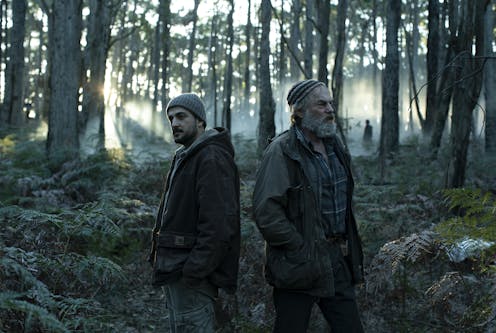The Rooster is a study of fragile, lonely masculinity
- Written by Stuart Richards, Senior Lecturer in Screen Studies, University of South Australia

This review contains mentions of suicide.
What does it mean to be alone? Who do you live for when it seems like you have no one? These are some of the big questions asked in The Rooster, a deceptively simple film from Mark Leonard Winter.
Before opening in cinemas this week, the film played at major film festivals in Adelaide, Melbourne and Brisbane in 2023 and Hugo Weaving recently won the best supporting AACTA for his performance as the hermit.
Winter’s feature directorial debut, The Rooster is a study of fragile, lonely masculinity.
Read more: The Zone of Interest: new Holocaust film powerfully lays bare the mechanisms of genocide
Guilt and devastation
Dan (Phoenix Raei) is a lonely country copper, whose morning routine is spent feeding his angry rooster. The film opens in a disorienting fashion that indicates Dan’s own fragile mental state. Before any image is shown, the crackle of Dan’s radio is interspersed with the evening crickets. “Hello? Can you hear me? I am not sure what to do,” Dan speaks into his radio. “Can you repeat that please? I don’t understand. I don’t know what to do.”
The first image we see is of a hanged body swinging in the wind lit by the car’s lights. Dan, in his car, is visible only by his red and blue lights. Suddenly, he looks up. We see a naked woman walking towards the car holding his rooster. Dan wakes up in a fright.
These opening images pose questions of Dan’s mental state for the audience. Who is this woman? Who is the hanged person?
The following day, Dan fails to follow police procedure when dealing with an incident. His childhood friend, Steve (Rhys Mitchell), is caught naked while spying on a girl’s netball team. The day after this, Steve is found dead in a shallow grave. While it is clear he committed suicide, this doesn’t explain the shallow grave. Dan’s superior (John Hughes) blames Dan for Steve’s death, as he failed to alert anyone over Steve’s risk for self-harm.
To make matters worse, Dan also discovers his much-loved rooster killed by a fox. Forced to take time off from work to process his guilt and devastation over Steve’s death, Dan retreats to the bush where Steve was found in search for answers.
How to cope with loss
Dan’s struggle to cope with this loss is depicted through the repeated nightmarish scenes of the bush, Steve clucking like a chicken and the naked woman holding his rooster.
While stumbling through the bush – its haunting beauty captured wonderfully by Craig Barden’s cinematography – Dan finds the hermit’s hut and spies the man having a bath through the window. The hermit initially threatens Dan and tries to drive him off. Dan, however, offers him a drink, which allows the two to have a conversation.
This informal tete-a-tete leads Dan to learn that the hermit was most likely the last person to see Steve alive.
In order to learn more about the hermit’s role in Steve’s death, the two must bond. Dan is introspective and shy; the hermit is prone to violent, angry outbursts. The two men drink heavily, play ping pong – sometimes naked – and help each other process their own hurt.
The film’s narrative is not driven by the investigation into Steve’s death. Rather, it is about two men learning how to cope with the loss in their lives. Through this friendship, both men learn how to share what has led them to being so isolated.
The Rooster is inconsistent in tone. Up until the moment where the two men meet, the film is slow and disorienting. Once the hermit confronts Dan for spying on him, the film kicks into gear, and the chemistry between the two men is the energy the film needs to progress.
For the most part, however, the balance of comedy and drama works. A heavy conversation about suicide quickly shifts, assisted by the two very different performances from Raei and Weaving.
“I can’t see myself in the future,” Dan says. “Your daughter, she’ll remember you. But when I’m gone, I’ll just be gone.”
“You won’t be gone,” the hermit replies. “You’ll be a fucking tree”.
This conversation on life’s failures and “ending things” quickly shifts into the hermit helping Dan release his feelings by crowing loudly like a rooster. A heavy conversation easily shifts into an absurd one.
The dynamics between both characters allows Raei and Weaving to excel in their performances. Winter primarily worked as an actor before this film, and this experience is evident in the space given to the two lead performers here, giving them extended moments to let their characters breathe. Capturing minute shifts in expression are key to Winter’s skill as a director.
The Rooster may be a small character study of two fragile men, but it’s a powerful examination of isolation and moving on.
The Rooster is in Australian cinemas from tomorrow.
If this article has raised issues for you, or if you’re concerned about someone you know, call Lifeline on 13 11 14.
Read more: All of Us Strangers: heartbreaking film speaks to real experiences of gay men in UK and Ireland
Authors: Stuart Richards, Senior Lecturer in Screen Studies, University of South Australia





